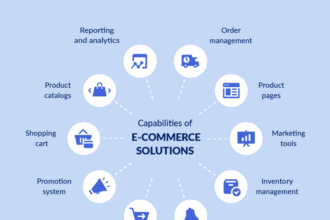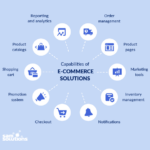E-commerce logistics solutions streamline the process of getting products from sellers to buyers. They handle everything from warehousing to delivery.
In the fast-paced world of online shopping, efficient logistics are crucial. They ensure products reach customers quickly and safely. For e-commerce businesses, having a reliable logistics partner can make or break success. It affects customer satisfaction and can influence repeat business.
With so many moving parts, from inventory management to shipping, choosing the right logistics solution is vital. This blog will explore the key aspects of e-commerce logistics. Discover how it supports your business growth and what to look for in a logistics partner. Stay tuned to learn more about optimizing your e-commerce logistics for success.

Credit: www.endurancelogistique.fr
Introduction To E-commerce Logistics
E-commerce logistics is the backbone of online retail. It involves the management of goods from the point of order to delivery. This process includes warehousing, inventory management, packaging, and transportation. Efficient logistics ensure that customers receive their orders on time and in good condition. This aspect is crucial for maintaining customer satisfaction and loyalty.
Importance Of Efficient Logistics
Efficient logistics play a vital role in e-commerce success. A well-organized logistics system can:
- Reduce delivery times
- Minimize shipping costs
- Enhance customer satisfaction
Here are some key benefits of efficient logistics in e-commerce:
| Benefit | Description |
|---|---|
| Faster Delivery | Quick deliveries improve customer experience |
| Cost Efficiency | Lower shipping costs increase profit margins |
| Customer Retention | Happy customers are likely to return |
Challenges In E-commerce Logistics
E-commerce logistics face several challenges. These include:
- High shipping costs
- Complex supply chains
- Inventory management
- Returns handling
High shipping costs can eat into profits. Complex supply chains can lead to delays. Managing inventory effectively is crucial to avoid stockouts or overstocking. Handling returns efficiently is important for maintaining customer trust.
Inventory Management
Effective inventory management is vital for any e-commerce business. It helps ensure you have the right products at the right time. This reduces costs and improves customer satisfaction. Let’s dive into two key aspects of inventory management: Real-Time Inventory Tracking and Optimizing Stock Levels.
Real-time Inventory Tracking
Real-time inventory tracking keeps your stock data current. It updates as soon as a sale is made or stock is added. This method prevents overselling and stockouts. It also helps in making data-driven decisions. Invest in a system that syncs with your online store. This way, your inventory is always accurate.
Here are some benefits of real-time tracking:
- Reduces human error
- Improves order accuracy
- Helps in demand forecasting
Consider using barcodes or RFID tags. They automate the tracking process. This saves time and increases accuracy.
Optimizing Stock Levels
Optimizing stock levels means maintaining the right amount of inventory. Neither too much nor too little. Too much stock ties up capital. Too little leads to missed sales. Use data to forecast demand. Adjust your stock levels accordingly.
Here are some tips for optimizing stock levels:
- Analyze sales data regularly
- Use inventory management software
- Implement reorder points
Reorder points help ensure you reorder stock before it runs out. Calculate reorder points based on past sales and lead time. This helps in maintaining a balanced inventory.
Here’s a simple table to understand reorder points:
| Product | Average Sales per Day | Lead Time (days) | Reorder Point |
|---|---|---|---|
| Product A | 10 | 5 | 50 |
| Product B | 20 | 3 | 60 |
By focusing on real-time inventory tracking and optimizing stock levels, you can improve your e-commerce logistics. This leads to better customer service and increased profits.
Order Processing
Order processing is a crucial aspect of e-commerce logistics. It involves receiving, managing, and fulfilling customer orders efficiently. Streamlined order processing ensures customer satisfaction and repeat business.
Automated Order Processing
Automated order processing speeds up fulfillment. It reduces human errors. Automation software processes orders quickly. This leads to faster deliveries. Customers appreciate prompt service.
Automation also updates inventory in real-time. It keeps stock levels accurate. This prevents overselling. It ensures customers receive their orders without delay. Automated systems track each order step. They provide transparency and efficiency.
Managing Returns And Exchanges
Managing returns and exchanges is essential for customer trust. A clear return policy helps. It makes the process smooth for customers. Efficient systems handle returns quickly. They restock returned items promptly.
Effective return management reduces costs. It keeps customers happy. They are more likely to shop again. Handling exchanges well also matters. Quick exchanges keep customers satisfied. They feel valued and cared for.
Warehousing Solutions
Warehousing solutions play a key role in the success of e-commerce businesses. They ensure that products are stored safely and can be dispatched quickly. Effective warehousing can boost customer satisfaction and reduce costs. Let’s explore some important aspects of warehousing solutions for e-commerce.
Choosing The Right Warehouse
Choosing the right warehouse is crucial for your business. Location is the first thing to consider. A warehouse close to your customers reduces shipping times. This leads to faster deliveries and happier customers. Size is also important. You need enough space to store all your products safely. But, avoid paying for more space than you need. The warehouse should also have the right facilities. Climate control can be vital for certain products. Security features protect your inventory from theft.
Warehouse Automation
Warehouse automation can greatly improve efficiency. Automated systems help with tasks like sorting and packing. This reduces the risk of errors and speeds up the process. Robots and conveyor belts can move products faster than humans. This leads to quicker order fulfillment. Automation also helps with inventory management. Software can track stock levels and predict when you need to reorder. This prevents stockouts and overstock situations. Automated systems can work round the clock, increasing productivity.
Shipping And Delivery
Shipping and delivery are crucial aspects of e-commerce logistics. They impact customer satisfaction and loyalty. Ensuring efficient shipping and delivery can set your business apart. Below, we’ll discuss how to select the best shipping partners and ensure timely delivery.
Selecting Shipping Partners
Choosing the right shipping partners is vital. Here are key factors to consider:
- Reliability: Consistent and dependable service.
- Cost-effectiveness: Competitive rates for your shipping needs.
- Coverage: Ability to ship to your target locations.
- Tracking: Real-time tracking for customer peace of mind.
Evaluate potential partners based on these factors. Compare their offerings and select the best fit. A good shipping partner helps enhance customer experience.
Ensuring Timely Delivery
Timely delivery is essential for customer satisfaction. Here are some tips to ensure prompt deliveries:
- Order processing: Automate and streamline order processing.
- Inventory management: Keep accurate inventory records to avoid delays.
- Communication: Keep customers informed about their order status.
- Backup plans: Have contingency plans for unexpected delays.
Implementing these strategies helps ensure your products reach customers on time. Happy customers are more likely to return and recommend your business.
Below is a comparison table of popular shipping partners:
| Shipping Partner | Reliability | Cost-effectiveness | Coverage | Tracking |
|---|---|---|---|---|
| Partner A | High | Medium | Global | Yes |
| Partner B | Medium | High | Local | No |
| Partner C | High | High | Global | Yes |

Credit: www.mbefrance.fr
Technology Integration
Technology integration is crucial in modern e-commerce logistics. Leveraging advanced technologies can streamline operations, improve efficiency, and enhance customer satisfaction. Here, we explore some key technologies that can transform your logistics solutions.
Implementing Erp Systems
Implementing ERP (Enterprise Resource Planning) systems can centralize your business processes. ERP software integrates various functions like inventory management, order processing, and customer service. This ensures seamless communication and real-time data access across departments.
Advantages of ERP systems:
- Improved data accuracy
- Enhanced productivity
- Better inventory management
- Reduced operational costs
ERP systems help in making informed decisions. They provide valuable insights and analytics on various business aspects. This integration can lead to more efficient and effective logistics operations.
Utilizing Ai And Machine Learning
AI (Artificial Intelligence) and Machine Learning can significantly enhance e-commerce logistics. These technologies can predict demand, optimize delivery routes, and automate repetitive tasks.
Here are some benefits of using AI and Machine Learning:
- Accurate demand forecasting
- Optimized delivery routes
- Automated customer service
- Enhanced warehouse management
AI-driven chatbots can handle customer inquiries and provide quick responses. Machine learning algorithms can analyze large datasets to identify patterns and trends. This helps in making data-driven decisions and improving overall efficiency.
Integrating these technologies into your logistics operations can lead to faster deliveries, reduced errors, and increased customer satisfaction.
Customer Service
Customer service plays a crucial role in e-commerce logistics. It’s the bridge between your business and your customers. Good customer service can lead to positive reviews and repeat business. Poor customer service can result in complaints and lost customers.
Enhancing Customer Experience
Enhancing customer experience is vital for e-commerce success. Quick and accurate responses to inquiries make customers feel valued. Clear communication about order status keeps them informed and satisfied. Offering multiple contact methods, such as phone, email, and chat, gives customers options. Personalizing interactions, addressing them by name, and understanding their history improves their experience. Training your team to be polite and helpful ensures positive interactions.
Handling Customer Complaints
Handling customer complaints effectively is essential. Acknowledge the complaint promptly to show you care. Listen carefully to understand the issue fully. Apologize sincerely if there’s a mistake. Offer a solution quickly to resolve the issue. Follow up to ensure the customer is satisfied with the resolution. Keep records of complaints to identify and fix recurring problems. Training your team to stay calm and professional helps in managing complaints better.
Sustainability In Logistics
Logistics plays a key role in the e-commerce industry. Sustainability in logistics has become essential. Companies are now focusing on reducing their environmental impact. This means adopting eco-friendly practices and reducing waste. Below, we explore two main areas: Eco-Friendly Packaging and Reducing Carbon Footprint.
Eco-friendly Packaging
Packaging is a significant part of logistics. Using eco-friendly packaging can reduce waste. Companies are opting for biodegradable materials. These materials break down naturally and do not harm the environment. Another option is using recyclable packaging. This allows materials to be reused, reducing the need for new resources.
Here are some popular eco-friendly packaging options:
- Biodegradable plastics
- Recycled paper
- Compostable materials
Another strategy is to minimize packaging. Reducing the amount of material used can lower waste. It can also decrease shipping costs. This benefits both the company and the environment. Below is a table summarizing eco-friendly packaging options:
| Material | Benefits |
|---|---|
| Biodegradable Plastics | Break down naturally, reducing pollution |
| Recycled Paper | Reduces the need for new paper production |
| Compostable Materials | Can be turned into compost, enriching the soil |
Reducing Carbon Footprint
Transporting goods contributes to carbon emissions. Reducing the carbon footprint is essential for sustainability. One way to achieve this is by using fuel-efficient vehicles. Electric and hybrid vehicles produce fewer emissions. They are becoming more common in logistics fleets.
Another method is route optimization. By planning efficient routes, companies can reduce travel distance and fuel consumption. This not only cuts emissions but also saves time and money.
Here are some tips for reducing the carbon footprint:
- Use electric or hybrid vehicles
- Optimize delivery routes
- Consolidate shipments to reduce trips
Implementing these strategies can have a significant impact. Companies can reduce their environmental impact and improve their efficiency. Sustainability in logistics is not just a trend. It is a necessary step towards a greener future.
Future Trends In E-commerce Logistics
The future of e-commerce logistics is evolving rapidly. Businesses need to stay ahead with new technologies and practices. There are several emerging trends that are shaping the logistics landscape. These trends promise to make logistics more efficient and transparent. Let’s explore two key trends in this sector.
Drones And Autonomous Vehicles
Drones are becoming a popular choice for last-mile deliveries. They can deliver packages quickly and bypass traffic. This can reduce delivery times significantly. Autonomous vehicles are also gaining traction. These vehicles can operate without human drivers. They can work round the clock, which increases efficiency. Both drones and autonomous vehicles can lower delivery costs. They also contribute to reducing carbon emissions.
Blockchain For Transparency
Blockchain technology is enhancing transparency in logistics. It allows all parties to track shipments in real-time. This ensures that there is no tampering with the data. It brings trust and accountability to the logistics process. Blockchain can also help in verifying the authenticity of products. This is crucial for industries that deal with high-value goods. Implementing blockchain can streamline operations and reduce fraud.

Credit: www.seafrigo.com
Frequently Asked Questions
What Is E-commerce Logistics?
E-commerce logistics refers to the process of storing and shipping products ordered online. It includes warehousing, inventory management, and delivery.
Why Is Logistics Important For E-commerce?
Logistics ensures timely delivery, customer satisfaction, and efficient inventory management. It directly impacts the success of an online store.
How Do Logistics Improve Customer Experience?
Efficient logistics ensure faster delivery, accurate order fulfillment, and real-time tracking. This enhances customer trust and satisfaction.
What Are The Challenges In E-commerce Logistics?
Challenges include managing high order volumes, ensuring timely delivery, and handling returns. Efficient logistics systems help overcome these issues.
Conclusion
Effective logistics solutions are crucial for e-commerce success. They ensure smooth operations and happy customers. Choosing the right partner can save time and money. Focus on providers with experience and proven results. Reliable logistics boost customer satisfaction and repeat sales.
Evaluate your needs and make informed decisions. Efficient logistics lead to growth and better market positioning. Invest in quality solutions to stay competitive.

















